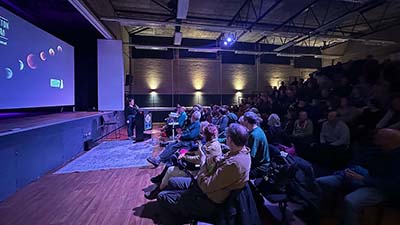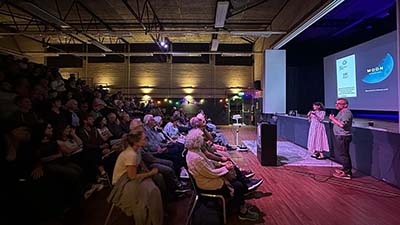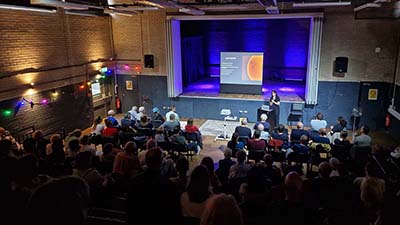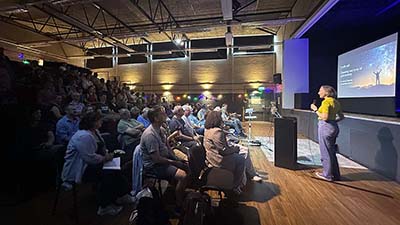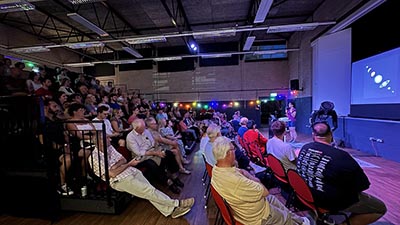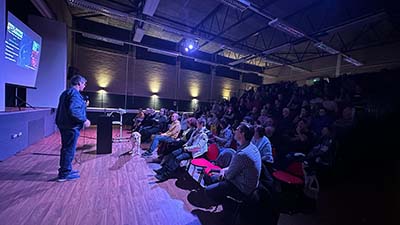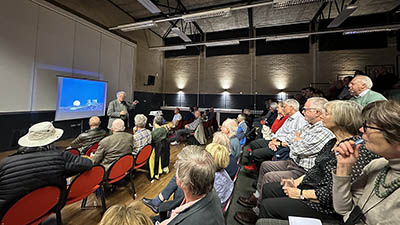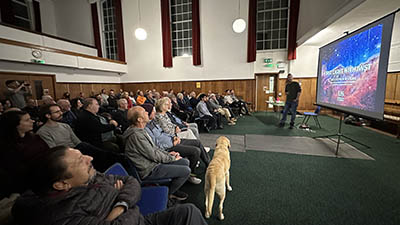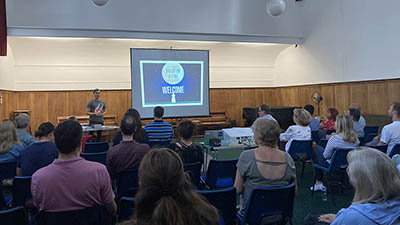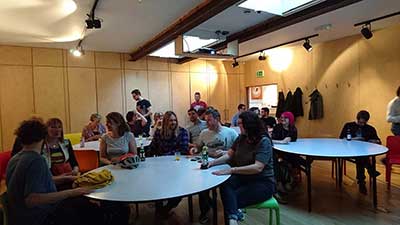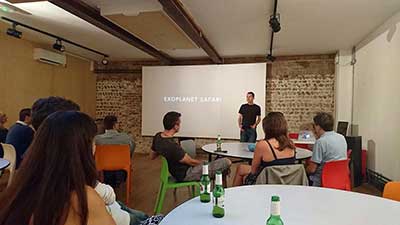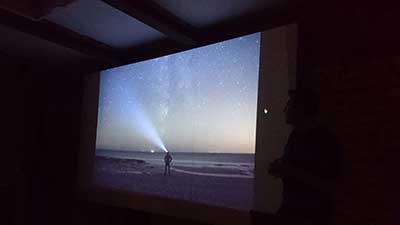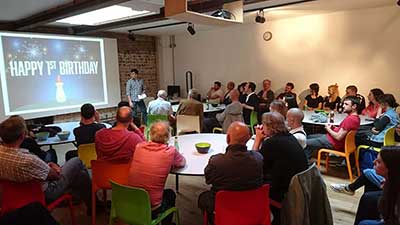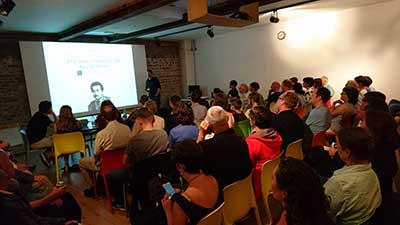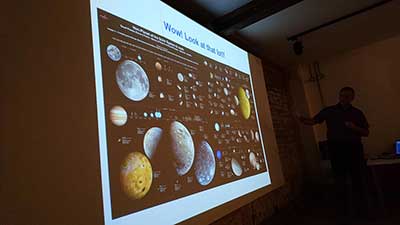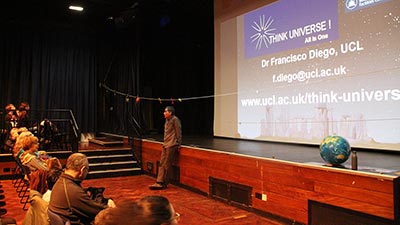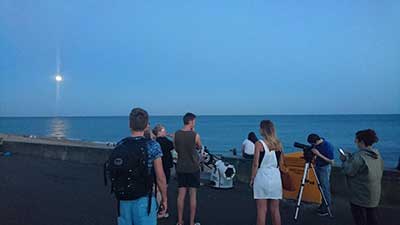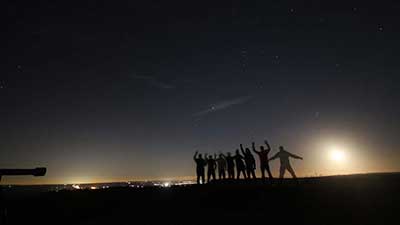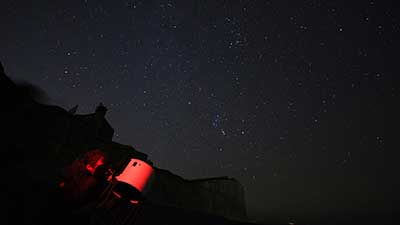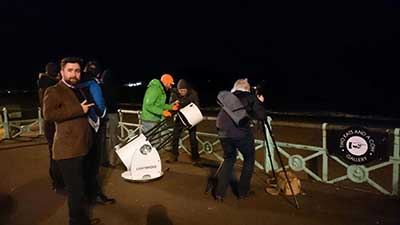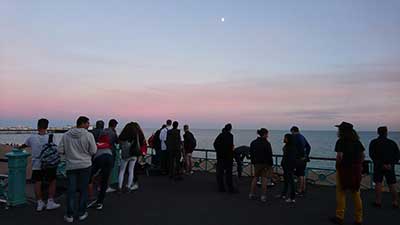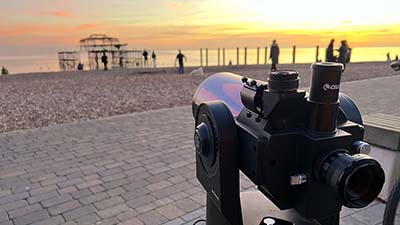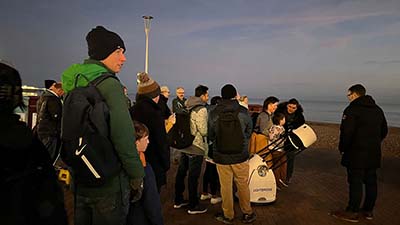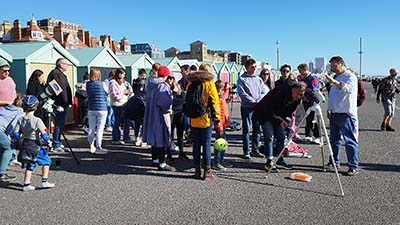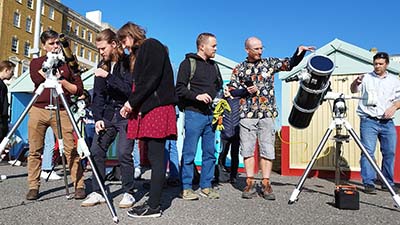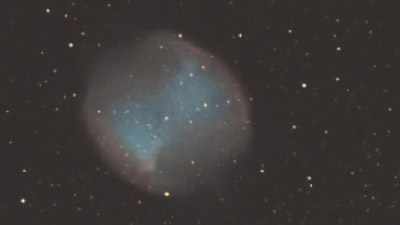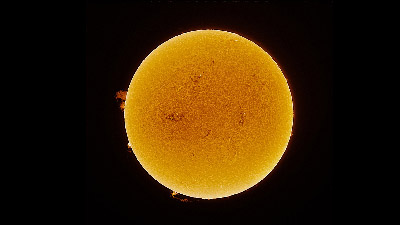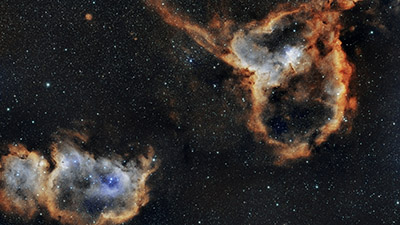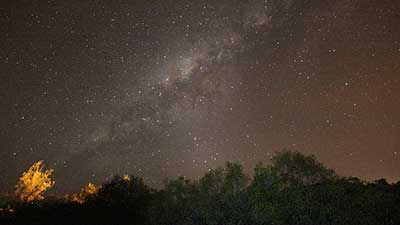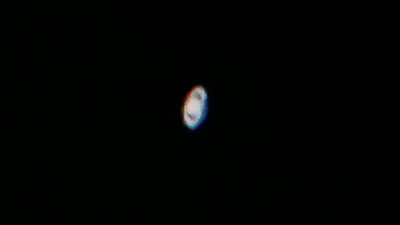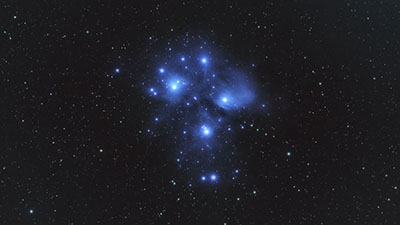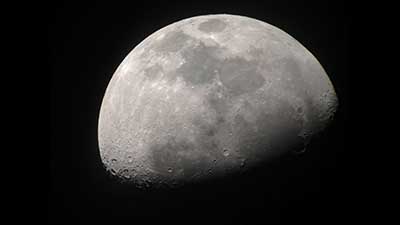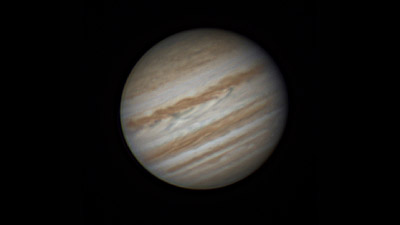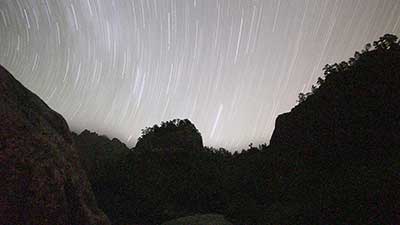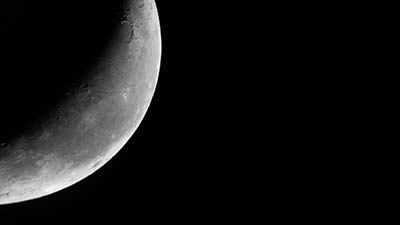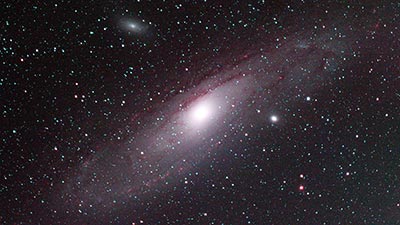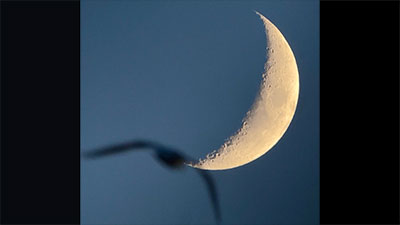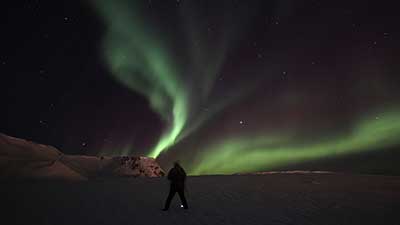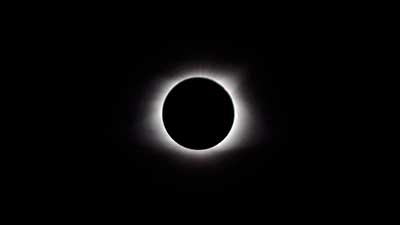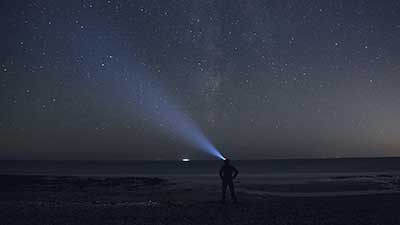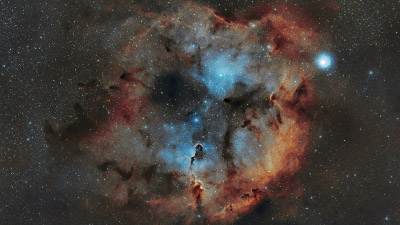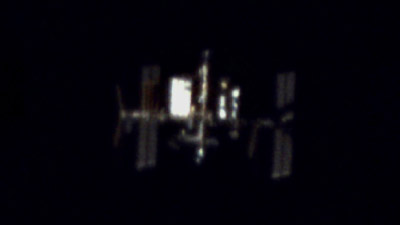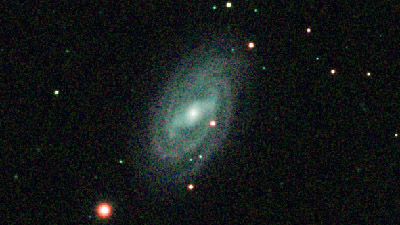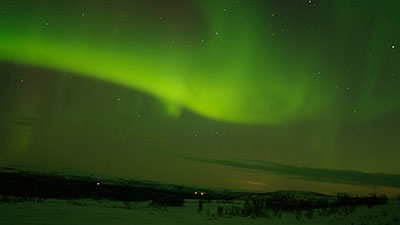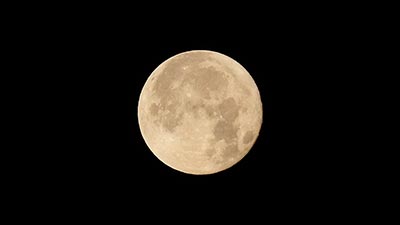-
Thursday 4th December 2025
Will Joyce
Minor Members of the Solar System
Previously Will has taken us on a journey through the inner
planets of our solar system, the outer planets and it's
major moons and now he comes back to continue our travels,
this time looking at the solar system's smaller objects.
Asteroids, comets and dwarf planets are small objects but
they are key to understanding our solar system. Many
important space missions have, and are, being flown to a
variety of these objects, which are as fascinating as they
are diverse.
-
Thursday 6th November 2025
Professor Stephen Wilkins
University of Sussex
The Quantum Universe
Quantum physics is the foundational theory that governs the
behaviour of matter and energy at atomic and subatomic
scales. Marking a century since its earliest breakthroughs,
the United Nations has designated 2025 as the International
Year of Quantum Science and Technology. As part of these
global celebrations, I will explore how quantum physics
underpins our understanding of the cosmos, focusing on two
powerful examples.
First, the energy that powers stars—including our Sun—comes
from nuclear fusion. Classically, the temperatures inside
stars are too low to overcome the repulsive forces between
atomic nuclei. However, quantum tunnelling allows these
nuclei to 'leap' through this energy barrier, making
fusion—and therefore starlight—possible.
Second, the large-scale structure of the Universe—its
galaxies, stars, and planets—can be traced back to tiny
quantum fluctuations in the very early Universe. During the
period of cosmic inflation, these quantum variations were
stretched to astronomical scales, seeding the structures we
observe today.
These examples highlight how quantum physics, though born
from the study of the very small, plays a pivotal role in
shaping the vastness of the Universe.
Stephen Wilkins is a Professor of Astronomy and Public
Understanding of Science at the University of Sussex,
located just outside Brighton. He earned his Master's degree
in Physics from the University of Durham and completed his
PhD at the University of Cambridge. Following a research
fellowship at the University of Oxford, Stephen joined the
faculty at Sussex in 2013.
His research centres on understanding the formation and
evolution of galaxies, with a particular focus on the
earliest stages of cosmic history. To explore these
questions, he combines observations from cutting-edge
telescopes—including the James Webb and Hubble Space
Telescopes—with advanced supercomputer simulations.
Beyond his academic work, Stephen is a passionate advocate
for science communication. He has led three exhibits at the
prestigious Royal Society Summer Science Exhibition and
delivered dozens of public talks aimed at making the wonders
of the Universe accessible to all.
-
Thursday 2nd October 2025
Dr Darren Baskill
University of Sussex
The Aurora in 2025/26
The aurora, the dancing lights that illuminate up the night
sky, is a wondrous sight. In this talk, we look at the
science behind the aurora to understand why they have been
so visible over Brighton over the last 18 months, and
consider the outlook for 2026. We will also look beyond
Earth at the aurora on other planets - both within our solar
system and beyond!
-
Thursday 4th September 2025
Dr Robert Massey (Royal Astronomical Society), and Dr
Alexandra Loske (Royal Pavilion, Brighton)
Lunar Longings: The Moon in Art, Science and Culture
Humans have been fascinated with our nearest heavenly body,
the Earth's Moon, since prehistoric times. It has now been
more than 50 years since we set foot on the Moon during the
Apollo space missions. In this lecture astronomer Dr Robert
Massey (Royal Astronomical Society) and art historian and
curator Dr Alexandra Loske (Royal Pavilion, Brighton) and
will show how our obsession with the Moon has manifested
itself in the visual arts, from earliest ritualistic
drawings to scientific observation, Romantic symbolism,
silent movies, and space race propaganda.
In 2019 Alexandra and Robert co-authored a book on the
subject: Moon - Art, Science, Culture, which has been
translated into Spanish and Chinese. In 2019 Alexandra
edited an anthology on recent creative writing on the Moon:
Pale Fire - New Writing on the Moon. Most recently, she
contributed to chapters to a major new book on the Moon:
Lunar: A History of the Moon in Myths, Maps + Matter (Thames
& Hudson and University of Chicago Press). Robert is the
deputy director of the Royal Astronomical Society.
-
Wednesday 6th August 2025
Ivana Peranic
Solar Imaging 101: how to see the activity on our closest star
As we revel in the 2025 solar maximum, Brighton-based
cellist by day and astrophotographer by night, Ivana, will
take us through best ways to observe and photograph all the
amazing features on the surface of the Sun. From sunspots to
filaments and flares, from £20 solar film to £2000 solar
telescopes, we will explore what is necessary for safe
observation and uncovering of our Star's turbulent activity.
-
Wednesday 2nd July 2025
Dr Jenny Shipway
Look up! Sharing our love of astronomy
There's a real joy to sharing a passion. Our natural impulse
to share interesting new information and experiences with
others is a cornerstone of human society. Most people
interested in astronomy will have pointed out stars and
planets to family or friends, but the opportunities go far
beyond this. There are a wide range of organisations and
projects across the UK (and beyond) that offer different
ways to share your interest, with the chance to make a real
and positive impact both on individuals and society as a
whole.
Dr Jenny Shipway is a professional science communicator with
a background in science centres and planetariums. She now
works as a consultant, writer, and project manager. She
coordinated National Astronomy Week 2025 and is involved
with a number of national and international networks,
including the Federation of Astronomical Societies. She has
a particular interest in education, and in bringing
different people and organisations together to share skills
and resources to achieve more than would otherwise be
possible.
-
Thursday 5th June 2025
Jay Farihi
UCL
The Second-Life of Planetary Systems
Defying the notion of the silent graveyard, planetary
systems refuse to die quietly. Instead, a significant
fraction show one or more signs of dynamical reanimation,
with strong indications of general mayhem during the last
stages of stellar evolution. I will give a brief tour of
these evolved and active planetary systems, which provide
major insights into rocky planetary bodies in particular.
These descendants of intermediate-mass stars reveal
characteristics of their former planetary systems in ways
unattainable by conventional methods using main-sequence
stars. In particular, the metal pollution observed in white
dwarf stars reveals the bulk chemistry of entire
planetesimals or planetary fragments, including compelling
evidence for Earth-like chemistry, planetary
differentiation, and believe it or not - water. This talk
will cover some of the highlights of the active planetary
graveyard, including variability and transient behavior.
Jay Farihi hails from Southern California, where he did his
PhD at UCLA searching for substellar companions to white
dwarf stars using infrared imaging. He held a postdoctoral
position at Gemini Observatory on the big island of Hawaii,
and was a senior fellow at the Institute for Astronomy in
Cambridge. He was awarded an STFC Ernest Rutherford
Fellowship in 2012 and joined the faculty of UCL in 2013,
where he is now professor. He is best known for his role in
establishing the field of planetary systems orbiting white
dwarfs, especially using infrared observations to establish
the presence and nature of their planetesimal debris disks,
and how these link to the heavy element pollution seen in
their atmospheres. He enjoys hardcore punk and metal, is a
whisky fanatic, loves to travel, and has spent over 150
nights on summits pursuing his own research programs.
-
Thursday 1st May 2025
Quantum talks
It's that time of year again when Brighton Astro invites its
members to take centre stage and talk on any subject they
like for 10 minutes - as long as it is space related. This
year we have a great line up and a brilliantly diverse range
of subjects:
-
Ivana Peranic
Narrowband Planets: Planetary imaging in UV, IR, and
methane bandpasses
-
Russ Flawn
Project: Satellite (DNA to LEO!)
Our space balloon project only got us so high. This
time we're going all the way up to Low Earth Orbit!
-
John
Habitable worlds around Red Dwarf stars... or not!
Some important conditions concerning the possibility of
habitable exoplanets around Red Dwarf stars, that's
often overlooked.
-
Simon Binns
Flight controller launch poll...
-
Thursday 3rd April 2025
Peter Grimley
The European Southern Observatory — over 60 years at the
cutting edge of astronomy
The European Southern Observatory — ESO — was established in
1962 to provide astronomers in Europe with access to the
southern skies by operating an observatory in Chile, via an
agreement with the government of Chile. Its five founding
Member States have now grown to sixteen, including the UK,
which joined in 2002. Since its inception ESO has been at
the forefront of technological and engineering development
and it now operates a suite of telescopes on three sites.
ESO is currently building the biggest optical/infrared
telescope ever constructed — the ELT. In this talk I will
describe ESO, its history and some of the cutting-edge
instruments it now operates, and I will highlight just a few
of the remarkable discoveries made with those facilities.
Peter Grimley is an editorial consultant working with ESO
(through a contract with Design & Data GmbH), the U.S.
National Optical-Infrared Astronomy Research Laboratory
(NOIRLab), the Square Kilometre Array Observatory and the
International Astronomical Union. He has a BSc in Physics
with Astrophysics from Leicester University and a PhD in
astronomy from University College Cardiff, and he held
teaching and research posts in University College Dublin,
the Dublin Institute for Advanced Studies and St Patrick's
College Maynooth. He then spent a number of years in the
Civil Service, before returning to the world of astronomy in
a variety of public engagement roles. Peter is a Fellow of
the Royal Astronomical Society (RAS) and manages a programme
of talks for the Friends of the RAS (ras.ac.uk/friends)
-
Thursday 6th March 2025
Tahani Baldwin
University of Sussex
Mercury 13: The Pioneering Women Who Defied the Space Race and
Fought for Their Place Among the Stars
During the height of the Space Race between the U.S. and the
Soviet Union, a little-known yet revolutionary program dared
to defy the norms of the 1960s. Spearheaded by visionary
aerospace physician Dr. William Randolph Lovelace ll, this
groundbreaking initiative sought to answer one bold
question: Could women endure the physical and psychological
demands of spaceflight? The answer came from thirteen
extraordinary women - accomplished pilots who challenged
societal expectations and excelled under gruelling tests,
often surpassing their male counterparts. Though the program
was ultimately discontinued, their resilience in the face of
entrenched prejudices became a powerful and enduring symbol
of progress and possibility. This Women's History Month, we
honour these trailblazing women, whose courage and
determination not only shaped the history of human
spaceflight, but also inspired generations of explorers to
reach for the stars.
-
Thursday 6th February 2025
Professor Stephen Wilkins
University of Sussex
Exploring the end of the dark ages
In our current understanding, our Universe emerged from an
incredibly hot, dense state roughly 14 billion years ago.
While initially incredibly hot and full of light as the
Universe expanded it cooled, eventually becoming dark,
entering a period known as the "cosmological dark ages".
During this period dark matter and gas, attracted by the
force of gravity, developed into structures, eventually
leading to the formation of the first stars and galaxies,
lighting up the Universe. This earliest period of galaxy
formation is now accessible thanks to the James Webb Space
Telescope (Webb). Webb not only allows us to identify
examples of early galaxies but learn about their detailed
physical properties. Webb has already thrown up surprising
results including many more super-massive black holes in the
early Universe than expected.
-
Thursday 5th December 2024
Dr Steven Cutts
Medical implications of space flight
In this talk Dr Steven Cutts discusses the medical
implications of space flights using colour photographs of
the human body and previous experience of Nasa astronauts in
outer space he explains how individual systems react to the
zero gravity environment. What is the likely radiation dose
from a trip to the Moon or Mars versus a stint on the
international space station? What threat do we face in low
earth orbit from the increasing amounts of space debris
accumulating at the 250 mile mark?
Will it be possible to simulate gravity by spinning a space
craft in outer space and if we actually try to do this how
will the inner ear react? What are the chances that the
first man on Mars will fall over as soon as he steps outside
of the spacecraft and break his femur?
And if we really do try to colonise other planets and have
children there will any of those colonist be able to return
to Earth?
-
Thursday 7th November 2024
Amber Shepherd,
University of Sussex
Studying the universe on a tabletop
There is still a lot that we do not understand about our
universe, such as dark matter and dark energy.
Much of our understanding of dark matter comes from
observations made from far out galaxies. We are building a
very sensitive tabletop device to gather data which may help
to answer some of these questions. This talk will explore
what new physics tabletop experiments may uncover, as well
as the quantum technology we are setting up to search for
dark matter.
-
Thursday 3rd October 2024
Will Joyce
Many Moons of the Giant Planets
Spacecraft exploration of the outer planets and their
extensive systems of moons discovered a variety of strange
new worlds, some planet-sized, many challenging conventional
science, and some being downright bizarre. Plus, several may
even be home to life, despite being well outside the Sun's
"Habitable Zone"!
This discussion surveys many of these fascinating worlds
using spectacular imagery and modern scientific ideas,
including:
-
Why is Io the most volcanically active world in our Solar
System?
- Can Europa really support life as we know it?
-
Can deep water oceans exist inside several large, medium
and small worlds?
-
Is Titan a "future Earth" currently stored in "deep
freeze"?
- Can moons collide, break apart, and reform?
-
Current and future space missions to try to obtain some
answers.
Many important questions remain, and possibilities are
actively debated among planetary scientists.
Join the discussion!
-
Thursday 5th September 2024
Louis and Russ
Project: Space Balloon (DNA to the edge of space)
Ever wanted to go to space, like... for real? Well, now you
can! Come and learn how budding astronauts Louis and Russ
launched their DNA to the edge of space... and even managed
to retrieve it! Come and learn exactly how they did it, how
you could do it too, and if their DNA has changed because of
it.
-
Thursday 1st August 2024
Dr Eva-Maria Mueller
University of Sussex
Into the Darkness: Understanding the mysterious Dark Energy
Join me on a journey into the enigmatic realm of dark
energy, the unseen force accelerating the expansion of our
universe. In this talk, I will guide you from the
ground-breaking discovery of dark energy to the forefront of
current research, unravelling its profound implications for
the cosmos. Designed for curious minds of all backgrounds, I
will illuminate the latest theories and experiments,
revealing how dark energy shapes our universe's fate. Come
along as we explore one of science's greatest mysteries,
transforming our understanding of the cosmos and our place
within it.
Eva-Maria Mueller is currently an Ernest Rutherford Fellow
and proleptic lecturer at the University of Sussex studying
the large-scale structure of our Universe to decipher the
mystery of Dark Energy. Previously, she was a Dennis Sciama
Fellow at the Institute of Cosmology and Gravity at the
University of Portsmouth, and a research fellow at the
University of Oxford. Eva-Maria gained her PhD from Cornell
University researching extensions to the cosmological
standard model.
-
Thursday 4th July 2024
William Joyce
Weird and Wonderful Worlds : A Whistlestop Tour of the Outer
Planets
A guided tour around the strange, alien worlds of the outer
Solar System with stunning imagery of places and processes
which challenge and expand our current understanding.
Many unfamiliar and totally alien worlds have now been
explored by robotic spacecraft. This talk will present
amazing images and discuss unusual and fascinating facts
about each Giant Planet and some bizarre moons, a few of
which could even harbour life.
-
Thursday 6th June 2024
Dr Sonali Shukla
University of Cambridge
Brown Dwarfs: Linking Stars and Planets
Stars and planets are distinct astronomical objects yet
their formation processes are intertwined. Brown dwarfs
straddle both categories, exhibiting characteristics of both
stars and planets but not quite fitting into either
category. This talk will explore the history, discovery and
latest results from the study of brown dwarfs, drawing
parallels with low-mass dwarf stars and giant planets.
Studying brown dwarfs enhances our understanding of
concurrent star and planet formation, shedding light on the
origin of the solar system and beyond.
-
Thursday 2nd May 2024
Quantum talks
It's that time of year again when Brighton Astro invites its
members to take centre stage and talk on any subject they
like for 10 minutes - as long as it is space related. This
year we have a great line up and a brilliantly diverse range
of subjects:
-
Simon Binns: I am a Lunatic
Simon discusses his love of and fascination with the moon
-
Russell Flawn: My neighbour and the conCERNing
discovery of a Lepton Pair
A very brief history of the adventures of Carmen Hunt and
her escapades at CERN as a student working with celebrity
scientists when they discovered the Muon's secret twin
sisters!
-
Julie McDermott: Astro for kids: encouraging curiosity
about space through art
A look at ways to inspire kids to delve into the wonders
of astronomy and visualise tricky concepts through
hands-on creative activities.
-
David Sang: What stars are made of
How Cecilia Payne discovered the composition of the stars
and invented the science of astrophysics.
-
Thursday 4th April 2023
Neil Phillipson
Mankind's Next Giant Leap
Neil explains the incredible achievements of the post-Moon
era - showing how the vast body of work the scientific
community has done since the Moon landings has led us to the
moment when we shall, at last, become a space-faring
civilisation, ready to explore and colonise the Solar System
and beyond - bringing vast benefits to Earth and
transforming society for the better. He presents a bold
vision of a better future - one in which innovation and
progress flourish while war, poverty, illness and hunger are
finally relegated to history.
-
Thursday 7th March 2024
James Croft
University of Sussex
Eating the Sun: The Cultural Significance of Eclipses
All throughout history, and all across the world, eclipses
have been viewed as significant events. The civilisations of
ancient China, ancient Egypt, and ancient Britain have seen
in them signs and symbols, portents of things to come. What
can we learn about our history - and about ourselves - from
our species' response to eclipses across the ages? Join Dr.
James Croft, University Chaplain and Lead Faith Advisor at
the University of Sussex, to find out!
-
Thursday 1st February 2024
Dr Darren Baskill
University of Sussex
Astrophotography - without a telescope!
Digital cameras, originally developed for astronomical
research in the 1970's & 80's, are now commonplace. With
immediate feedback allowing a rapid learning curve, what
used to take weeks or even years of dedicated practice can
now be done within an hour. And as software and digital
technology continues to rapidly improve, getting great
photographs of the night sky has never been easier.
In this lecture, Darren will share ideas for
astrophotography that you can try at home - without the need
for a telescope. From the Moon to the Milky Way, and from
shooting stars to star trails, Darren will be sharing his
tips on how to take great, original photographs of the night
sky.
Dr Darren Baskill has over 25 years of experience in
astrophotography since studying astrophysics at the
University of Leicester. He began using old-fashioned film
and patience, and is now stunned on a regular basis at the
sensitivity of modern digital cameras. Darren also initiated
the Astronomy Photographer of the Year competition when he
worked at the Royal Observatory, Greenwich, and is now a
lecturer at the University of Sussex in Brighton.
-
Thursday 18th January 2024
Professor Malcolm Longair
University of Cambridge
The JWST - from a gleam in the eye to spectacular success
I have been fortunate enough to be at the forefront of all
the developments which have led to the launch and incredible
success of the JWST. These include the development of
infrared and submillimetre astronomy, of the Hubble Space
Telescope, of ALMA and the JWST. These projects will be set
in the context of developments in Astrophysical Cosmology.
We are now addressing key questions about the origin of
galaxies and the stars within them. The lecture will be
profusely illustrated with recent images and videos.
-
Thursday 7th December 2023
Dr Robert Massey
Royal Astronomical Society
A Cluttered and Noisy Sky
65 years ago the Soviet Union placed the first satellite in
space. There are now around 5,000 satellites in low-Earth
orbit (LEO), the region up to 2,000 km above the ground, and
their deployment is accelerating. 2019 saw the launch of
Starlink, a satellite constellation built and launched by
SpaceX, a system that on its own could soon have more than
30,000 spacecraft deployed. With other operators we could
soon see up to 300,000 satellites in LEO by the end of this
decade.
This is nothing less than a step change in our use of space.
And like most paradigm shifts, it will have significant
consequences. A key example is how it will affect the
science of astronomy and our view of the sky. Some estimates
suggest that as many as 1 in 10 'stars' visible could be
satellites, and professional and amateur astronomers alike
now face significant challenges to our work. As a result our
community has mobilised, working at a national,
international and global level to tackle a complex problem,
and to try to find a balance between the positive results of
boosting communications and the impact on the space
environment.
Robert will set out the problem, what it means for
scientists and the wider public, and what we can do about
it.
-
Thursday 5th October 2023
Professor Stephen Wilkins
University of Sussex
Exploring the Dark Universe with Euclid
For the best part of a century cosmologists have known that
our model of the Universe is incomplete. Specifically,
beginning in the mid-20th century it was realised that the
motions of stars and galaxies suggested the existence of
additional matter that doesn't interact with light. This
matter was subsequently dubbed dark matter. Toward the end
of the 20th century it was also realised that the expansion
of the Universe was accelerating, at odds with a Universe
containing just matter. This led cosmologists to propose a
new form of energy, dark energy.
While the observational evidence for dark matter and dark
energy is now very strong a theoretical understanding is
still lacking. To better understand these phenomena
cosmologists have created the Euclid mission which launched
in early July this year. Euclid is a visible and infrared
space observatory built by the European Space Agency and
partners. Over its six year mission Euclid will survey
around 1/3 of the entire sky allowing it to build a 3D map
of the Universe. From this map it's possible to better
constrain the properties of dark matter and dark energy
hopefully providing new insights into their nature.
-
Thursday 7th September 2023
Ivana Peranic
Astrophotography 101 - planetary, lunar, and solar imaging
If your astrophotography interest lies within our Solar
System, join me for an evening of exploring ways of imaging
the Sun, Moon and planets, as well as the International
Space Station!
These astrophotography disciplines are perfect for us city
dwellers because they aren't made more difficult by light
pollution. I will take you through equipment and processes
needed to start taking photos of those rings of Saturn or
craters on the Moon, as well as dedicated solar telescopes
that show us incredible flares on the Sun!
-
Thursday 6th July 2023
Tom Elphick
Astrophotography 101 - Deep Sky Objects
My interests in photography and space were bound to collide
at some point!
In this talk I will take you through my learnings and the
practical side of capturing nebulae and galaxies with a
telescope and camera.
Astrophotography comes with a steep learning curve that
requires a lot of perseverance and patience but is so
rewarding! We'll deepdive into tools & processes and share
some of the images captured above Brighton so you too can
begin your astrophotography journeys!
-
Thursday 1st June 2023
Dr Darren Baskill,
University of Sussex
Observing the Hawaiian Skies
The best places to observe the night sky also have some of
the most extreme conditions on the planet. British
astronomers have access to telescopes at an altitude of
4,200m on the summit of Mauna Kea, on the Big Island of
Hawai'i. This talk is a personal perspective on making
astronomical observations in harsh conditions using various
observatories at the top of Mauna Kea.
-
Thursday 4th May 2023
Archis, Philip, Jason, Simon and Behnood
Quantum talks
In physics, quantum refers to the smallest packet of
something and, in this meeting, Brighton Astro will be
hosting five short but beautifully-formed talks in one
evening.
Presented by Brighton Astro members, we will cover a wide
array of subjects, including black holes, the new Vera Rubin
observatory in Chile, astronomy in ancient Greece, space
junk and the planetary orbits of Tatooine (topical for May
the fourth...)
A lot of ground will be covered in a short time so hang on
to your hats for an information blitz and whirlwind of fun
and interest.
-
Thursday 6th April 2023
William Joyce
A Whistle-stop Tour of the Inner Planets
A guided tour around the inner Solar System reveals links
between our planet and its siblings, with fascinating
discoveries and new mysteries revealed by spectacular space
missions.
This discussion provides a quick introduction to the nearest
planets in our Solar System, presenting their characters,
unique features, and comparisons with our own planet. Many
fascinating aspects will be encountered, with plenty of
spectacular imagery from recent space missions.
-
Thursday 23rd February 2023
Andrew McGee
Cinema's Final Frontier: Exploring 120 Years of Space on the
Big Screen
Since the very first science fiction film in 1902,
filmmakers and cinema audiences alike have been captivated
by outer space. The cosmos has proven to be an ideal canvas
for all genres, from futuristic spectacles to grounded
scientific drama, existential horror to satirical comedy.
During the last century, mankind's exploration of our solar
system and beyond has inspired countless portrayals of
space, which have pushed the boundaries of storytelling and
filmmaking technology to their limits.
In this talk, Andrew will discuss a wide range of films
throughout cinema's history to explore how our relationship
with space, and our understanding of it, has evolved over
the decades.
From Georges Méliès A Trip to the Moon to Christopher
Nolan's Interstellar and (not quite) everything in between,
what is it about space that sparks our imagination, and why
does it keep bringing us back to the box office?
-
Thursday 26th January 2023
Dr Paul Giles
University of Sussex
Cosmology in Crisis: Galaxy Clusters to the Rescue
Over the past decade, there has been a growing crisis in
astronomy. In the 1920s Edwin Hubble observed that the
Universe is expanding. However, in recent years, the two
main methods used to probe this expansion have produced
inconsistent results. Observations of the cosmic microwave
background using the Planck satellite and estimates of the
recessional velocities of local galaxies don't match up.
What could be causing this difference? Do we require a
modification to our current understanding of the Universe,
or is this simply a mistake in one of the measurements? We
have other probes of cosmology that can help solve this
issue, one of which is galaxy clusters. Galaxy clusters are
the largest gravitationally bound structures in the
Universe, and the number of them present in the Universe
gives us an understanding of the conditions of the early
Universe and hence cosmology. In this talk, Paul will show
how galaxy clusters may come to the rescue in the current
Hubble tension crisis.
-
Thursday 24th November 2022
Colin Stuart
Time in Einstein's Universe
Few people know that time travel isn't just possible - it
has already been done.
In this mind-expanding talk, you will hear the stories of
people who have travelled into their own futures and lived
to tell the tale. And how you rely on the same physics
whenever you use the map on your smartphone.
We'll also look at messy time travel paradoxes, from if it's
possible to kill a baby Hitler to the fact that the free
will you think you have is probably a stubbornly persistent
illusion.
This is physics at its most interesting, guaranteed to get
you thinking deeply and seeing the world anew.
-
Thursday 27th October 2022
Jim Rowe, FRAS
Co-founder of the UK
Fireball Alliance
and
Fireballs Aotearoa
Recovering freshly-fallen meteorites using meteor camera
images - from Winchcombe to Otago
When a fireball blazed across English skies 18 months ago,
its trajectory was recorded by sixteen specialised meteor
cameras. Scientists from the UK Fireball Alliance almost
immediately knew where to look for the resulting Winchcombe
meteorite. Jim Rowe, one of the co-founders of UKFAll talks
about the organisation, its people, fireball events and how
UKFAll knew where the Winchcombe meteorite fell. He'll also
talk about the (so far) unsuccessful meteorite search in
Shropshire in spring, his founding of Fireballs Aotearoa in
New Zealand based on learnings from Winchcombe and the
resulting September 2022 search for a freshly-fallen
meteorite in Otago, New Zealand.
-
Thursday 20th October 2022
Professor Mike Edmunds
President of the Royal
Astronomical Society
The ancient Greek Antikythera Mechanism and the mechanical
universe
Brighton and Hove U3a in conjunction with Brighton Astro
invite their members to a special event.
Mike Edmunds, the new President of the Royal Astronomical
Society, will be giving a presentation on the ancient Greek
Antikythera Mechanism.
How did our view of the Universe develop? Most of us have at
least some hazy idea of the fundamental shift that came
through the work of Copernicus, Kepler, Galileo and Newton.
The idea of a 'Mechanical Universe' tends to be associated
with these 16th and 17th century pioneers. Yet recent
investigations based around the Antikythera Mechanism, an
ancient Greek geared artefact from around 100 BCE, reinforce
a view that the 'Mechanical' conception has been around for
a much longer time - indeed, certainly as far back as the
3rd century BCE.
The discovery of the structure and functions of the
Antikythera Mechanism by modern imaging methods will be
described, and a strong claim (based on literary references)
will be made that knowledge of mechanical representations of
the Universe was critical in the development of cosmology
and philosophy. There is evidence that the technology
persisted until its spectacular and rather sudden
re-appearance in Western Europe around 1300 CE. From then on
it is not hard to chart a path through the astronomical
clocks of the 16th century. But is a mechanical viewpoint
still useful in 21st century physics?
-
Thursday 29th September 2022
Dr Stephen Wilkins
University of Sussex
First Light with JWST
The James Webb Space Telescope, which launched on Christmas
Day 2021, is the long-awaited successor to both the Hubble
and Spitzer Space Telescopes. JWST is an international
collaboration, featuring strong involvement from the UK.
Ultimately thousands of scientists from around the world
will use data from JWST to answer a range of scientific
questions. JWST will enable an enormous range of science
from allowing us to identify the first stars and galaxies to
form in the Universe to probing the atmospheres of alien
planets. In this talk I'll introduce some of the first
observations, and scientific results, from JWST.
-
Thursday 25th August 2022
William Roper
University of Sussex
Building A Universe In A Box
Galaxies are as diverse and complex as people, however, they
evolve over distinctly non-human time scales and their
unfathomable size means they can't be poked and prodded in a
laboratory. Instead, to unlock the secrets of their
formation and evolution, we look out into the Universe using
telescopes (such as the Hubble Space Telescope or Webb Space
Telescope). Unfortunately, these only provide a (albeit very
pretty) snapshot of a galaxy, frozen in time. To truly
understand how galaxies evolve we need something else:
simulations! But how do these work? How do you take a
computer and reproduce a population of galaxies? In this
talk, I will show exactly how astrophysicists build these
toy Universes, and how they help us understand our own
Universe's past, present and future.
-
Thursday 28th July 2022
Dr Alexandra Loske
The Royal Pavilion & University of Sussex
Women and the Moon
The principle of male and female duality has in many
cultures and for thousands of years been compared to the
juxtaposition of the Sun and the Moon - the two most
prominent objects in the sky. In many - but not all -
languages and cultures, the Moon is female. Yet, so far,
only men have walked on the Moon, and the role of women in
lunar culture and exploration has been undervalued. In this
talk, Alexandra will provide an enlightening overview of
women and the Moon in literature, art, and science, from the
ancient to the new, via overlooked female astronomers and
strong female characters in science fiction.
-
Thursday 26th May 2022
Dr Simon Steel,
Deputy Director of the Carl Sagan Center
SETI: The Search for Extra Terrestrial Intelligence
Our guest speaker this month is Dr Simon Steel, Deputy
Director of the Carl Sagan Center at SETI (Search for
Extra-Terrestrial Intelligence) to discuss his work and the
SETI project. This is a unique opportunity to learn about
what is arguably the most exciting project in all of space
exploration, the search for other intelligence life.
-
Tuesday 25th February 2020
William Joyce
The Search for Intelligent Life in Deep Space
Are there other intelligent beings in the universe? How can
modern science try to answer this age-old question? Prepare
for a glimpse into the scientific method applied to the
search for alien intelligence.
The Search for Extra-Terrestrial Intelligence attempts to
discover, once and for all, an answer to the age-old
question of whether other intelligent life exists among the
stars. This discussion describes how searches for signs of
intelligent life are conducted and informed by scientific
astronomical considerations. The implications of search
results to-date are explored including thought-provoking
ideas such as the concept of Galactic colonisation and a
possible glimpse of the future with speculation about
interstellar travel.
-
Tuesday 28th January 2020
Ciaran Fairhurst, University of Sussex
10 Hubble Images we just can't get enough of. You won't
believe number 4!
The Hubble space telescope turns 30 in April. From detailed
images of the planets of the solar system to studies of the
entire Universe's evolution - Hubble has possibly been the
most successful space science project in a generation. To
celebrate three decades in the sky, join me for a rundown of
its greatest hits the only way millennials know how - with a
numbered list.
-
Tuesday 10th December 2019
Brighton Astro Xmas space quiz
Back by popular demand... come and join us for a Brighton
Astro xmas space quiz!
Don't worry if you don't know people, we'll be putting
together teams on the night, so just come along.
A bit of space knowledge may help but it's not essential,
we'll try to make sure the teams are evenly matched.
-
Tuesday 27th November 2019
Dr Dirk Froebrich, University of Kent
HOYS-CAPS - Hunting Outbursting Young Stars
I would like to introduce to you our observational citizen
science project Hunting Outbursting Young Stars with the
Centre for Astrophysics and Planetary Science (HOYS-CAPS) at
the University of Kent.
The project aims to measure the brightness of young stars in
selected young clusters/star forming regions in multiple
optical filters over a long (~20yr) time with a high cadence
(1-5days). Given weather constraints we aim to do this as a
collaboration of amateur astronomers from the UK, Europe and
from across the globe. The light-curves we are obtaining
will be used to study multiple aspects of the formation of
stars and planets. In particular we are aiming to
characterise the structures in accretion disk around the
young stars in unprecedented detail and to study the mass
accretion history of stars. We are of course also keeping an
eye out for the most unusually behaved objects.
We have so far 54 people/observatories that are actively
participating in the data taking for our 21 targets, and we
have obtained ~8800 images. In total our database now
contains ~91.5 million brightness measurements of stars.
Some of these have already been used in 3 publications with
amateurs (if they wish) as co-authors, and several more are
in preparation.
-
Friday 1st November 2019
Professor Lucie Green
Our Brilliant Sun
110 times wider than Earth; 15 million degrees at its core;
an atmosphere so huge that Earth is actually within it: come
and meet the star of our solar system. Light takes eight
minutes to reach Earth from the surface of the Sun, but its
journey within the Sun takes hundreds of thousands of years.
This talk will take you from inside the Sun to its surface
and onwards to Earth, to discover how the Sun works. Find
out how a solar storm can threaten the modern technology
that society relies on and learn more of the latest research
in solar physics.
Lucie Green is Professor of Physics at the Mullard Space
Science Laboratory. She studies the Sun and is particularly
interested in the Sun's magnetic field and how solar weather
can affect us here on Earth. She is well known for her
appearances on Stargazing Live and The Sky at Night.
Presented with
Brighton Cafe Scientifique
-
Tuesday 24th September 2019
Melanie Vandenbrouck, Royal Museums Greenwich
Picturing the universe
The winners of the
Insight Astronomy Photographer of the Year competition
will be announced at Royal Museums Greenwich on 12 September
2019. Long time judge and art curator Melanie Vandenbrouck
will be talking about some of her favourites from this and
previous years of the world's greatest amateur
astrophotography. She will show that you don't necessarily
need expensive equipment or deep astronomical knowledge to
create inspiring, moving or impressive pictures of the
universe. Creativity, an eye for composition, or being there
at the right time are sometimes all it takes.
-
Tuesday 27th August 2019
Meirin Oan Evans, University of Sussex & ATLAS Experiment at
CERN
A tunnel to the beginning of time
As astronomy enthusiasts, you may have heard of ways to
study the Big Bang using telescopes and space satellites.
But is there any other way? CERN, the biggest science
laboratory in the world, is trying to do just that. 100m
underground at CERN, there's a 27km round tunnel called the
Large Hadron Collider, where we're trying to recreate the
conditions of the Big Bang here on Earth. This will allow us
to tackle really big questions such as: What are the
building blocks of matter? What are the forces between them?
What happened to antimatter? What's dark matter? What was
the early universe like and how did it evolve? What about
gravity? Is there anything else we haven't thought of…?
-
Tuesday 30th July 2019
Melanie Vandenbrouck, Royal Museums Greenwich
Curating the Moon
Melanie Vandenbrouck is Curator of Art post-1800 at Royal
Museums Greenwich. In 2019, she is curating two exhibitions
about the Moon to commemorate the 50th anniversary of the
Moon Landing.
Moonlight
at the Hasselblad Foundation (to 22 September), focuses on
contemporary lens-based artists responses to the Moon since
Apollo.
The Moon
at Royal Museums Greenwich looks at humanity's long
fascination for our cosmic companion. A long-time lover of
the Moon, she found a new fascination for astronomy thanks
to the Insight Astronomy Photographer of the Year
Competition of which she has been a judge since 2013.
-
Tuesday 25th June 2019
Colin Stuart
How We'll Live on Mars
Colin is an astronomy speaker and author who has talked to
over half a million people about the universe, ranging from
schools and the public to conferences and businesses.
His books have sold more than 300,000 copies worldwide and
he's written over 150 popular science articles for
publications including The Guardian, New Scientist, BBC
Focus and the European Space Agency.
-
Tuesday 28th May 2019
Dr David Whitehouse
Apollo 11 - The Inside Story
Local author David Whitehouse will recount the story of the
Apollo moon landing as told by the crew of Apollo 11 and the
many other astronauts who paved the way or followed after
the first man to walk on the moon, Neil Armstrong, alongside
Buzz Aldrin and Michael Collins. Astronauts, engineers,
politicians, NASA officials, Soviet rivals - all tell their
own story of a great moment of human achievement.
-
Tuesday 30th April 2019
Quantum talks
In physics, quantum refers to the smallest packet of
something and, in this meeting, Brighton Astro will be
hosting four short but beautifully-formed talks in one
evening. Presented by Brighton Astro members, we will cover
a wide array of subjects such as supernovae,
astro-photography, the Apollo missions and animals in space.
A lot of ground will be covered in a short time so hang on
to your hats for an information blitz and whirlwind of fun
and interest.
-
Tuesday 26th March 2019
Nick Sayers
Art inspired by astronomy, physics and maths
Local artist Nick Sayers will talk about his
science-inspired interactive art projects, including Cycle
The Solar System, Bicycle Drawing Machines and sun-capturing
pinhole cameras. He will discuss how - through these works -
he has creatively explored astronomy, physics and
mathematics, making these abstract subjects more accessible
to a wider audience.
-
Monday 25th February 2019
Melanie Davies,
Creative Space
The Pleiades: History, myths & science
The Pleiades, in the constellation of Taurus and has been an
object of fascination throughout human history.
This lecture starts with a historical overview of the oldest
known representations of this glistening cluster of young
stars. It goes on to discuss some of the better known myths
and legends associated with the group. Drawing on scientific
papers, the lecture then lays out some of our current
knowledge about the Pleiades including their evolution,
properties and the possible fate of this most beautiful open
cluster.
-
Tuesday 29th January 2019
Dr Stephen Wilkins, University of Sussex
Exploring the End of the Dark Ages
As we look out in to the Universe we also look back in time.
Eventually we reach a period of the Universe's history
before stars (and galaxies) had formed; these are the Dark
Ages. The Dark Ages were brought to an end by the formation
of the first stars and super-massive black holes some few
hundred million years after the big bang. The identification
of these first objects is one of the goals of modern
extragalactic astronomy.
While tremendous progress has been made with Hubble, its
small mirror and lack of infrared capability limits its
ability to probe this critical period of the Universe's
history. However, in the next decade a number of new
facilities will be coming online that will shine a light on
this critical period in the Universe's history. These
include: the Webb Telescope, the successor to both the
Hubble and Spitzer space observatories due to be launched in
2021; the new generation of "extremely large" ground based
telescopes; and the Square Kilometre Array, the next
generation radio telescope currently under construction in
Australia and South Africa.
-
Tuesday 27th November 2018
Becky Williams
Viewing the high redshift Universe (in 3D)
(No 3D glasses necessary!)
I will present some of my research which focuses on the
study of very distant (i.e. high redshift) galaxies using 3D
integral field spectroscopy in order to better understand
how galaxies evolved. High redshift galaxies are of great
interest as they give us a direct view into the past
allowing us to explore the depths of the early Universe.
However studying them is not an easy task as these extremely
distant galaxies are very faint and notoriously difficult to
detect. But we like a challenge!
I will discuss some of the underlying physics, techniques
and the motivations behind these studies, while drawing on
my own results for examples.
-
Tuesday 30th October 2018
Simon Holroyd
Professor Stephen Hawking
Professor Stephen Hawking is an internationally renowned
scientist. Why is it that someone once given only two years
to live in his twenties was still working after most of us
would have retired. What drove this extraordinary person
towards learning and sharing the great mysteries of the
universe for over half a century? This talk aims to provide
some background on Prof. Hawking, his life and times, how he
became the most famous scientist in the world, and the
legacy he leaves behind.
-
Tuesday 25th September 2018
Francesco Andreoli
Earth: a planet for life
Are we alone in the Universe? Is our planet so unique that
we only find the conditions for the development of
intelligent life here on Earth? During this talk Francesco
will explain what makes the Earth so special and how its
physical properties led to the development of life. He'll
then ponder how likely it is we will find similar conditions
elsewhere in space.
Francesco Andreoli is a Professional technical translator
and interpreter Born in San Giovanni Lupatoto, small town
near Verona, Italy. Grew up in Milan. Moved to London in
1974. Moved to Lewes in 2010, to Brighton 2015. Likes
photography and Videoing. Interested in Sciences, Astronomy,
Evolution of Man, Science-Fiction, Bible studies, All
combining to produce the Speech about the Universe, Life and
Man. Tendentially skeptical about everything.
-
Tuesday 28th August 2018
Paul Marchant
Casting Light on Light
Pollution from lighting has a negative impact on
observational astronomy and this impact may well get
considerably worse, without opposition. However, it is not
just astronomy that it is affected. This presentation will
examine the effects and side-effects of lighting.
Paul Marchant is a Chartered Statistician (CStat) of the
Royal Statistical Society (RSS) with a PhD in astrophysics.
He has served on the Council of the RSS and chaired the
Leeds and Bradford RSS Local Group. Since retirement, he
holds visiting fellowships at both Leeds Beckett University
and the University of Leeds. He was involved in the Loss of
the Night Network (LoNNe), an initiative of European
Cooperation in Science and Technology (COST) and is an
affiliate of the Consortium for Dark Sky Studies, based at
the University of Utah. He takes an interest in
evidence-based policy generally and sees good statistics as
essential in separating 'the wheat from the chaff'. He has
submitted evidence to Select Committee Inquiries into both
Research Integrity and Light Pollution … and there is a
link! He is sceptical of claims of significant safety
benefits of brighter, whiter public lighting, see
Marchant P (2017) 'Why Lighting Claims Might Well Be
Wrong', International Journal of Sustainable Lighting 19,
69-74
-
Tuesday 31st July 2018
Dimitrios Theodorakis, University of Sussex
A mini tour of the outer solar system
A mini tour of the outer solar system - current
missions/research on the gas giants and then my area of
research which is objects past Neptune such as Pluto, Sedna
and maybe Planet 9
-
Tuesday 26th June 2018
Professor Kathy Romer, University of Sussex
Clusters of galaxies - the shy giants of the universe
Clusters of Galaxies, when viewed with telescopes on Earth
and in space, are amongst the most beautiful objects in the
night sky. Theirs is not a benign beauty: they play host to
the most violent and energetic explosions in the present-day
Universe. This lecture will review the historical
contributions of that studies of clusters have made to the
theory of Big Bang Cosmology, and also describe how current
research into clusters at Sussex is uncovering the mysteries
of dark matter, dark energy and black holes.
-
Tuesday 29th May 2018
Colin Stuart
Astronomy author, writer and speaker
How To Weigh A Universe
The universe is a wondrous place filled with extraordinary
objects. Just as extraordinary is our ability to understand
them. In this talk - packed full of stunning visuals and the
latest scientific thinking - you'll hear how we're able to
put the universe on the scales. To work out what things in
space weigh without ever leaving the Earth. We'll meet some
of the most colourful and eccentric astronomers in history
and marvel at just how much of space we're yet to
understand.
Colin is an astronomy speaker and author who has talked to
over a third of a million people about the universe, ranging
from schools and the public to conferences and businesses.
His seven books have sold more than 100,000 copies worldwide
and he's written over 150 popular science articles for
publications including The Guardian, New Scientist, BBC
Focus and the European Space Agency.
-
Tuesday 24th April 2018
Irv Bartlett, and Dark Skies Dan from the South Downs National
Park
An Introduction to Astrophotography and Telescopes
A double-header talk, first we will have an introduction to
astrophotography from local photographer and Brighton Astro
regular Irv Bartlett, followed by an introduction to
telescopes from Dark Skies Dan from the South Downs National
Park
-
Tuesday 27th March 2018
Mark Crowe
Cassini's mission to Saturn
A look at the history, science and findings of the Cassini
missions since it's launch in 1997 - including stunning
images captured across 2 decades of discovery...
Cassini began the first in-depth, up-close study of Saturn
and its system of rings and moons in 2004. After its
four-year prime mission, it's tour was extended twice.
During the two-year Cassini Equinox Mission, the spacecraft
made 60 additional orbits of Saturn, 26 flybys of Titan,
seven of Enceladus, and one each of Dione, Rhea and Helene.
And in 2010, the spacecraft began a second, seven-year-long,
extended mission called the Cassini Solstice Mission,
concluding with 22 deep dives between Saturn's cloud tops
and innermost ring before it plunged into the giant planet's
atmosphere.
-
Tuesday 27th February 2018
Ciaran Fairhurst, University of Sussex
What keeps astronomers awake at night
Astronomy is ridiculously ambitious: we are attempting to
chart the history of the entire universe - and everything in
it - from the Big Bang to the present day. So far we've done
a pretty good job; we know why eclipses happen, how planets
form and how stars die. We know about planets around other
stars, distant galaxies and even how galaxies clump together
to form structures inadequately described as humongous. What
I want to do is talk about the gaps, the things we almost
know but not quite. I'll try to show you why they are so
tough, and how we're attacking them. We call them "open
questions" but really they're what have kept astronomers
observing and theorising for millennia: they're what keeps
us up at night.
-
Friday 16th February 2018
Dr Francisco Diego, UCL
Think Universe!
(part of the Brighton Science festival)
Mysterious creation myths still influence our culture, but
what does science say about the origins of the universe?
Join astronomer Dr Francisco Diego for a fascinating talk on
the relevance of science to modern culture.
-
Tuesday 30th January 2018
José Vieira, University of Sussex
Cosmology
Cosmology is perhaps best described as "the study of the
Universe as a whole". What does the Universe look like at
the largest scales? How did it come to be? How will it
evolve in the distant future? These are all important
questions which cosmology deals with.
In this talk we will briefly review the history of cosmology
- from when it was "born" of Einstein's theory of relativity
until recent years, when remarkable observational successes
have allowed it to mature into a fully-fledged scientific
field.
-
Tuesday 12th December 2017
Brighton Astro's xmas (pub) quiz!
Come and join us for a Brighton Astro xmas space quiz!
We have space (sorry) for 50 people. 8 teams of 6. Don't
worry if you don't know people or have a team ready, we'll
be putting together teams on the night, so just come
along...
A bit of space knowledge may help but not essential, we'll
try to make sure the teams are evenly matched.
-
Tuesday 28th November 2017
Nicholas Yeomans
Triton - Neptune's major moon
Join us to hear all about Triton, the largest moon of
Neptune. Nick will tell us about its origins, nitrogen
geysers, and its retrograde orbit.
Triton's recent occultation of a star gave astronomers the
first opportunity since the 1990s to detect atmospheric
changes.
-
Tuesday 31st October 2017
Peter Burr
Moons of the solar system
"Moons...they're just boring lumps of rock aren't they?"
Yeah right.
Our Solar system moons vary hugely and in total there
are...well come to our October meet and find out!
-
Tuesday 26th September 2017
Jarvis Brand
Planetarium coordinator,
The
Observatory Science Centre, Herstmonceux
Twenty(ish) ways the universe wants to kill you
The universe is not your friend! You might think that the
universe is a nice stable place that has allowed life to
develop but we're a freak, a long shot, a straight flush in
the poker hand of life and the cosmos stacks the cards
against you and we're never more than a statistic away from
annihilation.
In this light hearted look at our own extinction Jarvis
Brand discusses a range of ways from the small to the large
in which the end could come from rogue asteroids and
greenhouse effects to the big rip and membrane collision.
How dangerous are they and where can we stand at a safe
distance to watch the fireworks?
Jarvis Brand (B.Sc. (hons), M.Sc., PGCE) studied
Astrophysics and Physics at the University of Birmingham
where he was a research associate. He now runs the
planetarium for the Observatory Science Centre at
Herstmonceux.
-
Tuesday 29th August 2017
Dr Stephen Wilkins, University of Sussex
An introduction to Relativity
Einstein's special and general theories of relativity are
physical theories regarding the relationship between space
and time in addition to being the current description of
gravity in modern physics. Since their development in the
early 20th century they been subject to intense scrutiny and
empirical validation, with the most recent example being the
discovery of gravitational waves. Relativity has also drawn
significant attention outside the physical sciences because
of some of the seemingly counter-intuitive implications such
as time dilation and length contraction, concepts which have
become science fiction staples. In this talk I'll attempt to
provide an accessible introduction to relativity and its
implications.
-
Tuesday 25th July 2017
Peter Burr
The Voyager Missions
40 years ago, two spacecraft were sent on a journey, not of
one lifetime but thousands of lifetimes. Meet the Voyagers
and marvel at their missions into the unknown!
-
Tuesday 27th June 2017
Daniel Moinar, University of Sussex
Galaxy evolution
What would the sky look like through eyeballs the size of
tennis courts? What could we see if we had radio-wave
vision? Come and find out at our next Brighton Astro meet up
on Tuesday 27th June where PhD student Dániel Molnár will be
talking about the giant machines that allow us to do this,
and what we learn from them. In his PhD, he studies all
different types of galaxies, from "average" ones to violent
and intense so-called active galaxies.
-
Tuesday 30th May 2017
Ciaran Fairhurst, University of Sussex
Detecting the most distant galaxies
One of the salient questions in Astronomy is "How far away
is it?". As our equipment both literally and philosophically
has improved, this question has driven our view of the
universe to completely change. From a flat disc in the
centre of the universe below a static, unchanging heavens to
the modern day view: that the universe is an ever changing
mess in which we just happen to be along for the ride.
During this talk I'll try to talk about the how measuring
distances is done, describe what kinds of celestial objects
hold the records for farthest object, and briefly outline
how to use a telescope as a time machine.
-
Tuesday 25th April 2017
Group astrophotography show-and-tell
-
Tuesday 28th March 2017
Gareth Jenkins
Neutron Stars
-
Monday 27th February 2017
Gordon Laing
An introduction to Astrophotography
Gordon is the locally based founder and editor of
cameralabs.com, the site to visit for the most comprehensive camera
reviews and discussions. He'll be taking us through the
popular subject of astro-photography, sharing his vast
knowledge of photography and technical know-how to help us
all achieve those stunning shots of the night skies that we
love. We doubt you'll find anybody that knows a camera
inside and out better than Gordon and we are excited to have
such an authority address the group. There'll be something
for all levels and it's sure to garner wide interest so make
sure you arrive early to 68 Middle Street and take this rare
chance to pick the brains of a real expert.
-
Tuesday 31st January 2017
Gareth Jenkins
Black holes
-
Tuesday 29th November 2016
Pete G
Dark matter
-
Tuesday 25th October 2016
Olle Akesson
Life
-
Tuesday 27th September 2016
Phil McAllister
The big bang
-
Tuesday 30th August 2016
Richard Dallaway
Exoplanets
-
Tuesday 26th July 2016
Pete G
The night sky - beyond our solar system
-
Monday 20th June 2016
Pete G
Equinoxes and Solstices
Mat Cobianchi
Telescopes
-
Tuesday 24th May 2016
Pete G
The night sky - our solar system
Mat Cobianchi
Stellarium




